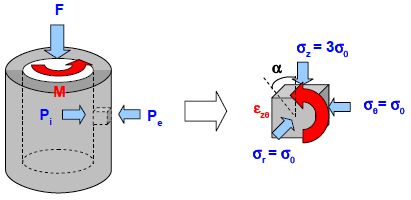1. Reference problem#
1.1. Geometry#
A torsional test is reproduced on a hollow cylinder subjected to internal \({P}_{i}\) and external confinement pressures \({P}_{e}\), to a vertical force \(F\) and to a torsional moment \(M\). This test is schematized by a cubic sample (a material point) subjected to confinement stresses \({\sigma }_{z}\), \({\sigma }_{r}\) and \({\sigma }_{\theta }\), and to a shear deformation \({\epsilon }_{z\theta }=M(t)\) (Figure).
If \({P}_{i}={P}_{e}={\sigma }_{0}\) and \(F=\frac{2{\sigma }_{0}}{\pi }\), the following confinement values are obtained:
\({\sigma }_{\theta }={\sigma }_{r}={\sigma }_{0}\)
\({\sigma }_{z}=3{\sigma }_{0}\)
We then have the following values of the main constraints:
\({\sigma }_{1}=2{\sigma }_{0}+\mid {\sigma }_{z\theta }\mid\)
\({\sigma }_{2}={\sigma }_{0}\)
\({\sigma }_{3}=2{\sigma }_{0}-\mid {\sigma }_{z\theta }\mid\)
But above all, the main axes rotate by an angle \(\alpha\) equal to [:ref:` 1 < 1 >`]:
\(\alpha (t)=\frac{1}{2}\mathrm{arctan}\left(\frac{2{\sigma }_{z\theta }(t)}{{\sigma }_{z}-{\sigma }_{\theta }}\right)=\frac{1}{2}\mathrm{arctan}\left(\frac{{\sigma }_{z\theta }(t)}{{\sigma }_{0}}\right)\)

Figure 1.1-a: Schematic diagram of the torsional test on a hollow cylinder
1.2. Properties of the sample#
The elastic parameters are:
the isotropic compressibility module: \(K=\mathrm{516,2}\mathit{MPa}\)
the shear modulus: \(\mu =\mathrm{238,2}\mathit{MPa}\)
The parameters of the Mohr-Coulomb law are:
the angle of friction: \(\phi =33°\)
the characteristic angle: \(\Psi =27°\)
cohesion: \({c}_{0}=1\mathit{kPa}\)
1.3. Boundary conditions and loads#
The torsional test presented here is carried out on a hardware point with the SIMU_POINT_MAT command.
We are taking a \({\sigma }_{0}=-50\mathit{kPa}\) lockdown pressure. The constraints imposed are therefore as follows:
\({\sigma }_{\mathit{xx}}={\sigma }_{\mathit{yy}}=-50\mathit{kPa}\)
\({\sigma }_{\mathit{zz}}=-150\mathit{kPa}\)
The imposed shear deformation \({\epsilon }_{\mathit{yz}}\) varies linearly between \(t=0\) and \(100\mathit{sec}\) from \(0\) to \(\mathrm{0,01}\text{\%}\) in \(N=10\) steps of time.